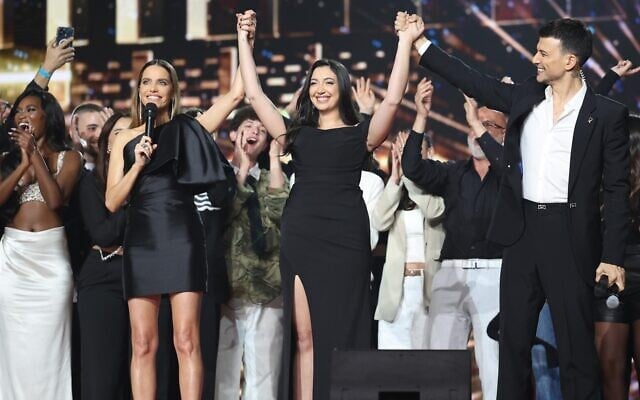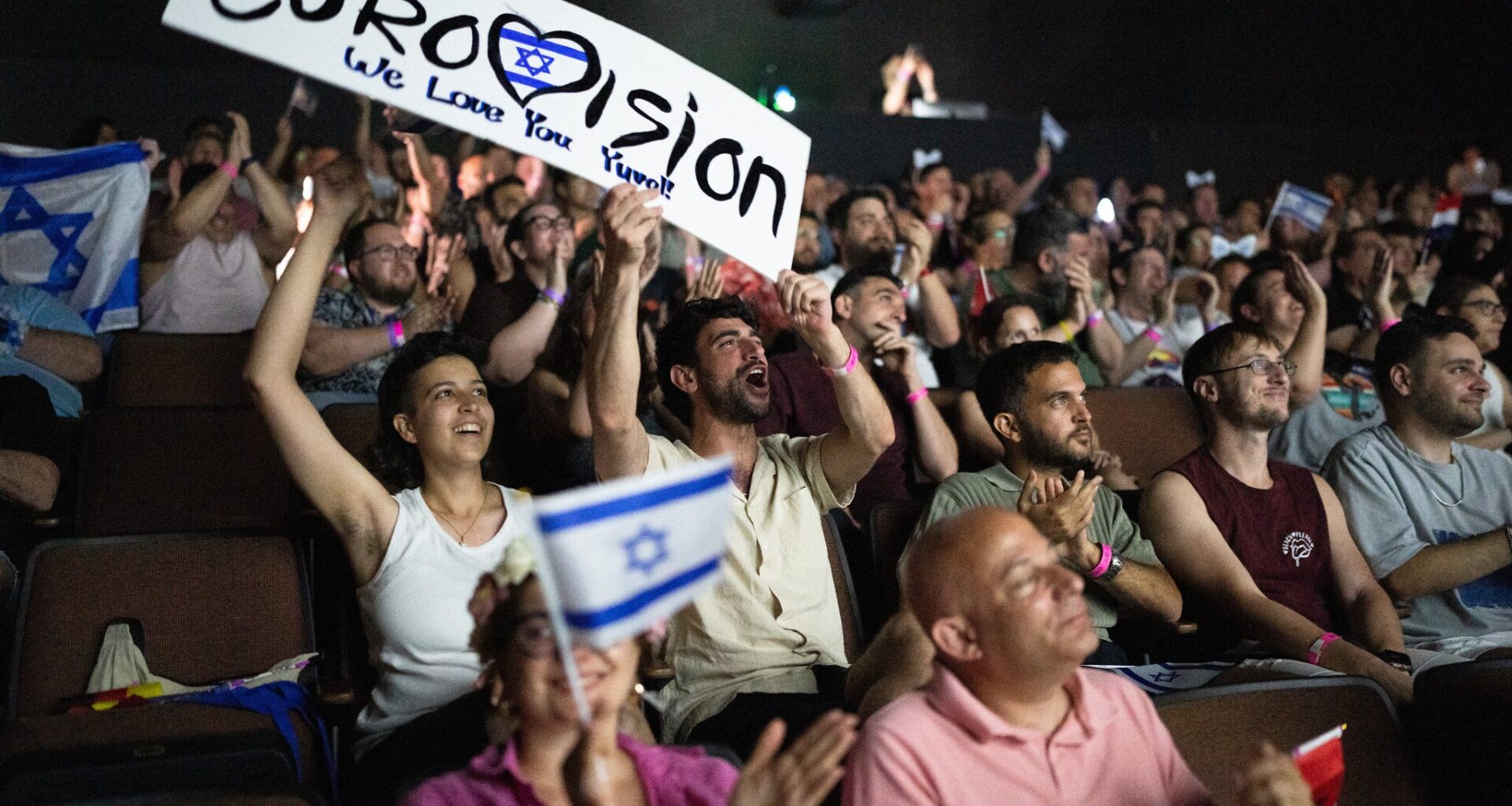With less than a month to go until the European Broadcasting Union makes a final decision on Israel’s participation in next year’s Eurovision, host Austria has been pushing publicly and behind the scenes for the Jewish state to be allowed to take part in the song contest.
Meanwhile, Israel is moving full steam ahead with its plans to compete, with the newest season of “Hakochav Haba” (Rising Star), which traditionally selects the country’s Eurovision entrant, officially kicking off Tuesday night.
While the decision on whether Israel will be allowed to remain in the competition is slated for early next month, the EBU has remained mum on how such a verdict will be reached, with signs pointing to the scrapping of a vote by member countries entirely.
Over the weekend, Roland Weißmann, the director general of the Austrian public broadcaster ORF — which is hosting next year’s contest in Vienna — visited Israel, meeting with officials from Israel’s Kan public broadcaster as well as President Isaac Herzog.
According to a Kan spokeswoman, Weißmann’s visit was aimed at “working to ensure that Israel participates in the Eurovision Song Contest” next year in Vienna.
Get The Times of Israel’s Daily Edition
by email and never miss our top stories
By signing up, you agree to the terms
Weißmann told Herzog that “Israel is an integral part of the contest,” according to Kan, echoing comments he and other Austrian officials have made publicly.

Kan CEO Golan Yochpaz (left) and Austrian public broadcaster Roland Weißmann (second from left) meet with President Isaac Herzog (second from right) in Jerusalem on November 7, 2025. (Courtesy)
The public broadcasters of some European countries, including Spain, Ireland and the Netherlands, have pledged to withdraw entirely if Israel takes part in the contest, and several others, including Iceland, Slovenia and Belgium, have threatened to follow suit.
Last month, Weißmann was quoted in ORF as saying that he was working to convince other participating countries that Israel should compete, adding that Vienna was deploying “diplomacy” and “tact” to bring them around.
He also said that the “financial risk” posed by some countries pulling out of the competition in protest, even a member of the “Big Five” – the five main EBU contributors, which include Spain – “is very manageable. Should one or two countries not participate, it is absolutely feasible.”
Austrian Chancellor Christian Stocker said last month that it would be “a fatal mistake to exclude Israel” from next year’s competition and that “based on our history alone, I would never be in favor of that,” a reference to Austria’s complicity in the Holocaust.
As the calls to bar Israel from the competition mounted, the EBU announced in September that it would hold a special online vote for members in early November to decide whether to allow the Jewish state to take part.
However, on October 13 — the day that the final 20 living hostages in Gaza were freed, three days into the current ceasefire — the EBU scrapped the plans to hold a vote, citing “recent developments in the Middle East.” Instead, the EBU said that a decision would be made at its General Assembly scheduled for December 4 and 5 in Geneva.

The headquarters of the European Broadcasting Union (EBU), which organizes the Eurovision Song Contest, seen in Geneva, on October 6, 2025. (Fabrice COFFRINI / AFP)
But the body has refused to say whether a vote would still be held, or how the decision would otherwise be reached. Asked by The Times of Israel this week about the process, the EBU would only say that the General Assembly would “discuss participation” in the contest, and that “further details” would be provided later to EBU members.
The EBU also confirmed that members will not have long to make a final decision on whether to participate once the ruling on Israel is finalized, with the deadline remaining “mid-December.”
A spokeswoman for Kan told The Times of Israel that the public broadcaster had not been provided with any more details on how the EBU decision would be made.
Israel is nevertheless marching ahead with efforts to select its contestant for next year’s competition, kicking off the process with the premiere on Tuesday night of singing competition “Hakochav Haba.”
Neither the hosts nor the judges gave any indication during the show’s kickoff that Israel’s participation at next year’s Eurovision hangs in the balance, discussing instead what kind of singer and song the country should send this year and predicting a win for the Jewish state.

Yuval Raphael is crowned the winner of ‘Hakochav Haba’ on January 23, 2025, and will represent Israel at the 2025 Eurovision. (Ortal Dahan Ziv)
Keren Peles, a judge on the show who also wrote the ballads that Israel sent to the 2024 and 2025 contests, suggested that the time had come to send a happy, uplifting song, with all the living hostages returned home and the war seemingly ending.
“I think the person who represents us this year deserves to sing a song that is appropriate for their age, and we can flip a switch and smile and sing about ‘Espresso Macchiato,’” said Peles, referencing the irreverent and popular song sent by Estonia to the 2025 competition.
The Walla news site, however, reported last month that the show has nevertheless put a “plan B” in place in case Israel does get kicked out of the competition, since the grand prize on “Hakochav Haba” is currently the right to represent Israel at Eurovision.
According to the report, the show set up a NIS 1 million ($313,000) backup prize, and the judges have been instructed to give feedback not just on contestants’ suitability for the Eurovision but also their overall performance.
The controversy over Israel’s participation heavily overshadowed the 2023 and 2024 Eurovision contests, with most international media coverage of those competitions focusing on the efforts to bar Jerusalem by countries outraged by the war against Hamas in Gaza. The subsequent backlash and campaign to drum up support for Israel’s contestants led them to ultimately soar in the public vote.
At the 2024 competition in Malmo, Sweden, Israel’s Eden Golan faced death threats as mass anti-Israel protests swarmed the city, and boos rang out inside the arena. Golan, who sang “Hurricane,” came in 12th in the jury vote and 2nd in the popular vote to finish 5th overall.

Eden Golan of Israel performs the song ‘Hurricane’ during the Grand Final of the Eurovision Song Contest in Malmo, Sweden, May 11, 2024. (AP/Martin Meissner)
A year later in Basel, Switzerland, Yuval Raphael – a survivor of the Nova festival massacre on October 7, 2023 during the Hamas-led attack that started the war – also faced protests and threats, as well as a smattering of Palestinian flags, which were allowed in the arena after the Swiss hosts loosened the rules that normally only allow flags of participating nations.
Raphael, who performed “New Day Will Rise,” topped the public vote but came 15th overall with the juries, ending up in 2nd place.
Israel has participated in the song competition since 1973, backing out of only three contests in the past 52 years – 1980, 1984 and 1997 – when the dates conflicted with Memorial Day or Holocaust Remembrance Day. Israel has won the contest on four occasions – in 1978, 1979, 1998, and most recently in 2018, with Netta Barzilai’s “Toy” — and has hosted it three times.

